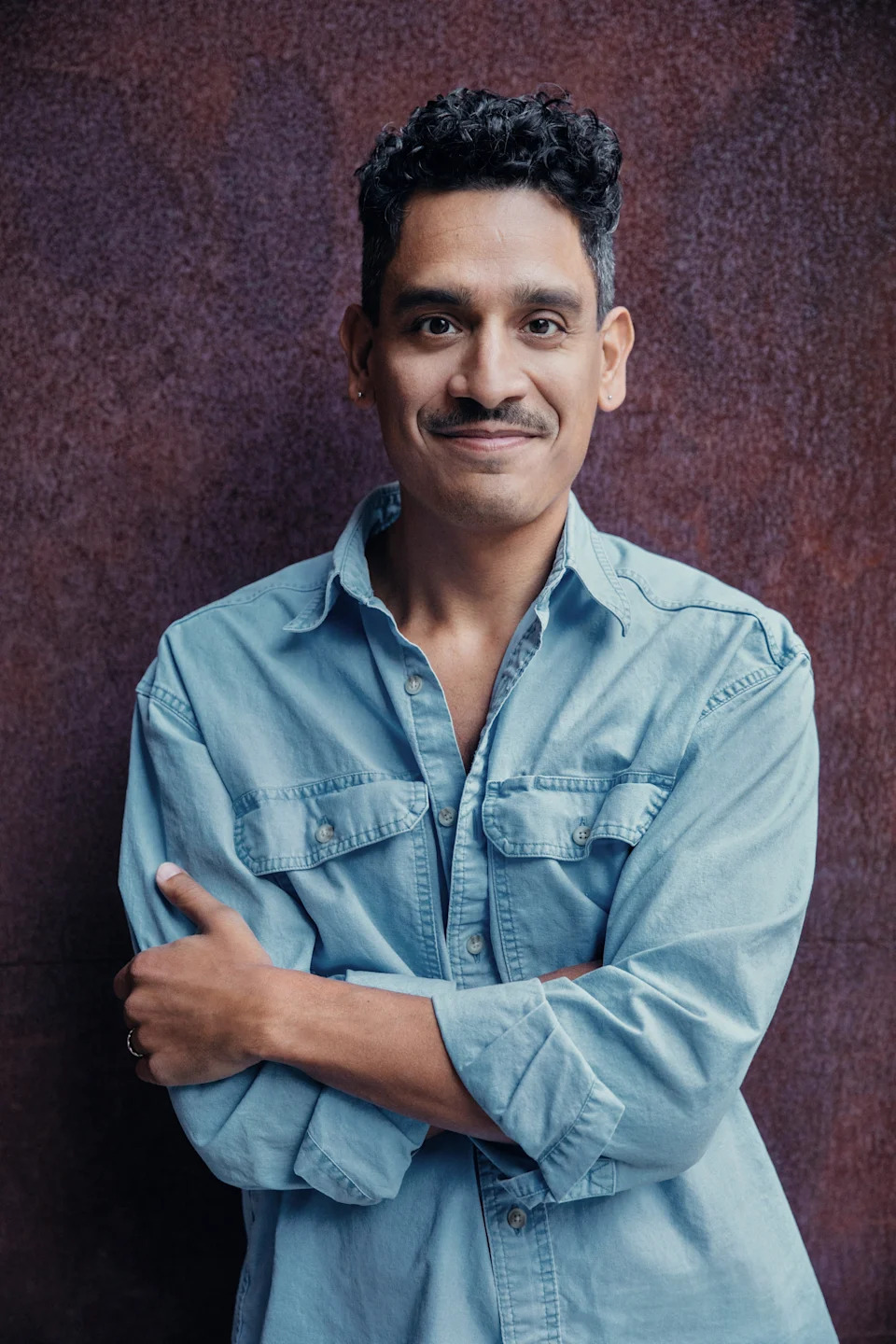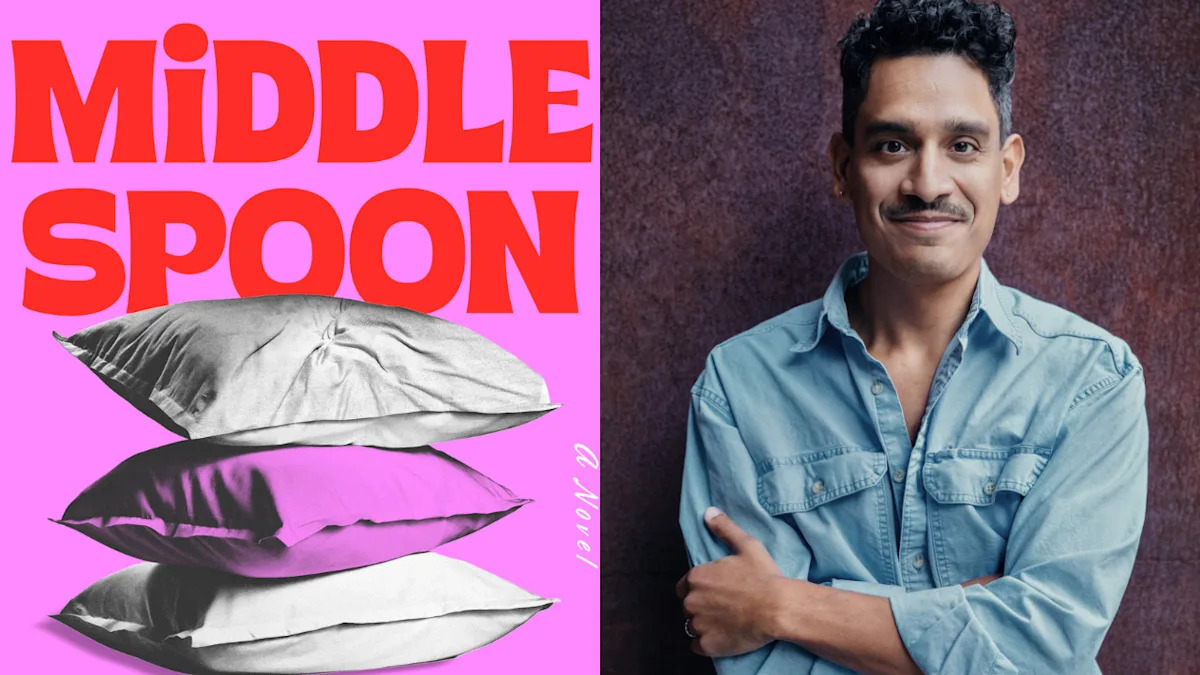When was the last time your heart broke?
It could have been a year ago or way back in high school. Maybe it was romantic in nature, or maybe it cracked while doomscrolling through the news of the day.
The point is that “heatbreak is universal,” says Alejandro Varela, author of “Middle Spoon” (Viking, pp. 336, out now). “It’s happening everywhere in the world, all the time, and it stays with you.”
When writing “Middle Spoon,” Varela, who considers himself a public health worker first and writer second, was “thinking about the grief we all carry with us at some point or another – whether it’s heartbreak or death or illness … any number of things can lead to grief.”
For all of the self-proclaimed yearners and lovers, or for anyone who has experienced love at its messiest, Varela hopes this book is the antidote.
“Middle Spoon,” written in epistolary novel form, follows an unnamed middle-aged narrator who, at first glance, is having his cake and eating it too. He’s happily married, has a doting husband with two adopted children, and he has a younger boyfriend named Ben. When Ben suddenly dumps him, however, there’s nothing that can bring him solace.
We see him unravel at the seams, spilling his heart out to anyone who will listen, including his two therapists, and so begins his journey of writing dozens and dozens of emails to Ben that he never sends.
“My own grief is weightier than I could have imagined; I’m cowed by the collective weight of billions of units of sadness,” Varela’s narrator writes in an unsent message to Ben.
Unlike the narrator of his book, Varela says he hasn’t experienced much loss in his life. “I haven’t had really close people to me die, and I hadn’t had my heart broken; I didn’t know that experience,” he says.
More: Men die of a broken heart more often than women, new study finds

Alejandro Varela
But when writing “Middle Spoon,” his circumstances changed: “I was going through a difficult personal time and I thought, ‘Huh, is this something that everyone deals with that I’ve just been so lucky to have never experienced?'”
This led Varela to think about people in the middle of their lives who have also never had a grief experience. Through interviewing people, he couldn’t believe how many remembered their first heartbreak so clearly.
“People said to me, ‘Oh my God, I could try just thinking about the time my heart was broken’ … it was like the floodgates opened. So many people were carrying this around. There are 8 billion people on this Earth,” Varela says. “How many people are dealing with this pain, and how come we never talk about it?”
Can you die from a broken heart? Symptoms, causes of broken heart syndrome.
With ‘Middle Spoon,’ Varela wanted to ‘connect with everyone at once‘
It may be hard to imagine that we don’t discuss heartbreak when it’s so deeply ingrained in pop culture. From the best breakup songs of all time lists to movies to help you survive a broken heart (on Valentine’s Day, no less), there’s no shortage of material for the broken-hearted.
But how earnestly are we opening up to others, even those closest in our lives, about our heartbreak?
“Sure, Taylor Swift writes songs about it,” Varela says. “It’s everywhere, but when do we truly talk about it? I’m not going to say to my boss, ‘Listen, I need a week off because my heart’s broken.’ At any given moment, if you have your heart broken, you still have to pay your bills and you still have to raise your children, you still have to do all of the things.”
See Oprah’s latest book club pick, ‘A Guardian and a Thief’ by Megha Majumdar
1 of 98
Before there was Reese or Jenna, there was the original book club maven — Oprah. “There is no best life without books,” Oprah Winfrey wrote on Instagram to mark 25 years of “Oprah’s Book Club” in 2021.
We have gathered all her official book selections in one place, dating all the way back to 1996’s inaugural book club pick.
Varela, who crafts stories not only to entertain readers but also to benefit them in ways that relate to their health and well-being, wondered what all this heartbreak in limbo does to our bodies.
“What does the brain look like? What does it feel like? I was trying in a way, with the different letters, to capture an anxious brain or mind that’s functioning all the time and trying to stay afloat while dealing with this pain,” he says.
Ultimately, Varela kept mulling over the grief people carry daily. “I thought how nice it would be to connect with everyone at once,” he adds. “What if I put this as raw as possible on the page, and then what might it trigger in other people, in a good way?”
Exploring polyamory in ‘Middle Spoon’ was ‘just another way of exploring conformity’
Beyond the neurotic, vulnerable, and all too relatable portrait “Middle Spoon” paints of heartbreak, the book attempts to pull the curtain on how it isn’t just about feelings when it comes to a queer polyamorous couple navigating society.
Varela’s narrator, his husband, their children, and his former boyfriend still exist in a capitalist society, and the narrator is aware of how race, class and gender penetrate their bubble. “I want to share with you a difficult moment, and then I want to talk to you about reparations and the tax code in the United States,” Varela says.
As a writer, “and as someone who is very preoccupied with this idea of conforming,” Varela says he wanted to explore this idea of polyamory as “just another way of exploring conformity and the ways in which society prevents us from having full and rich experiences.”
How Bad Bunny, Jenna Ortega, Karol G and more stars celebrate their Latino roots
1 of 36
Latino Heritage Month has arrived, and we’re celebrating the trailblazing entertainers who have lit up Hollywood and beyond with their talent and vibrant Latinidad.
Whether you identify as Latino, Latinx or Latine, the diverse community of 63.7 million U.S. residents is far from a monolith. From beloved icons Eva Longoria and Alejandro Fernández to innovative newcomers Becky G, Jenna Ortega and Karol G, we’ll be shining a spotlight on Latino creatives – and their love for their roots – all month long.
“I’m brown and queer and growing up, the message I got was that one or both of those things was wrong, and yet you persevere,” Varela says. “So the same with marriage, I was taught to believe that you’re with one person, you’re with them forever, you’re fully devoted, and if you do anything else, you’ll end up in hell.”
But Varela didn’t fully buy into that notion; he thought, “Maybe that’s another scarcity model approach.”
“Middle Spoon” isn’t meant to promote polyamory, Varela says, but it’s meant to ask, and challenge, the reader, “Why don’t we question things more often? Why don’t we have conversations that are difficult? Maybe the only reason that we’re not our full selves is because we’ve been told it’s not OK, but if we try, maybe we can make it work.”
This article originally appeared on USA TODAY: Alejandro Varela talks ‘Middle Spoon’, heartbreak and polyamory
